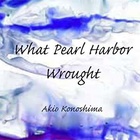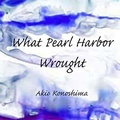Life: …the sequence of physical and mental experiences that make up the existence of an individual…from Webster’s New Collegiate Dictionary.
Father would have liked the simple ceremony at the cemetery where his ashes were being interred.
The group was small: just family and a few friends. Jo’s father was 92 years old when he died; his mother had passed away a short year and a half before. None of his father’s personal friends were there, all having already died or living far away from New York. The weather was warm for late October and the leaves had turned to varying shades of yellow, orange, and red, but non conifers still showed a bit of green along with the pines and cedars.
Jo did not grieve, though tears glistened in the eyes of others as his oldest brother spoke. Jo had talked to his father six months earlier in Honolulu. Despite his age, his father had still been healthy and lucid. He admitted, though, having difficulty remembering things. With Mother and all of those he knew gone, Father had made it plain that he felt it was time for him to go as well.
The cemetery, in Hartsdale just north of New York City, had only nameplates which lay flat on the ground to mark each grave along its hillsides. His father’s grave was next to that of Mother’s. It seemed appropriate that their final resting place was on the opposite side of the world from their native villages in Japan.
Father was of that generation from a Japan that took its cues from the West, especially America, and was hell bent on catching up. The West inspired ambitions that spurred that generation on. Young men of that time sought horizons that reached far beyond the confines of the Japanese islands. Though America had material wealth, that was not the main reason for his father leaving Japan. The underlying lure for him was a strong desire to experience what America was: a nation of nations.
His father and mother visited Japan several times after the end of the war. For them, though, it was a Japan that was no longer home. In the cemeteries of each of their villages—Mother’s in Saitama and Father’s in a remote area high up in the southern Japan Alps—they had family plots. But neither ever expressed any desire of being buried anywhere other than America. Their names and those of their children had been crossed off of the family register in Father’s native village.
Jo and his two brothers took turns shoveling the loose soil over the square brass urn holding their father’s ashes.
His wife, his children, his niece and her family, the son of the family where Jo’s mother and father were employed for so many years in the later part of the working lives, friends from his brother’s school—all were watching as soil was shoveled over the urn.
As he helped bury the urn, Jo thought of the times he had watched his father plant black walnuts in the orchard on their farm. The nuts sprouted and grew, and in a few years the saplings became the sturdy stock on which English walnuts were grafted.
Similarly, his mother and father’s transplanted family now seemed part of America’s stock for the future.
* * *
Jo was on temporary duty in San Francisco from Washington, D.C., riding the ferry from Larkspur Landing in Marin County to the pier in San Francisco, when he saw Angel Island, the Ellis Island of the West Coast. A fellow passenger told him the immigration station was off to the right, next to a red-roofed power station. In the background, dark green trees—pines, oaks, cypress and cedar—covered the hills to the water’s edge.
Though he looked, he was not sure if the small group of buildings he saw was indeed the former quarantine and detention center for immigrants.
Seeing the island stirred his emotions. More than 60 years before, his mother, alone with four children—the youngest only five-months-old—had come through that center. He had to visit the island himself, maybe experience just a tiny bit of what his mother had gone through.
A few days later, on visiting the island, he learned that the old administration building where the medical examinations were given had burned down in 1940. The immigration station was then moved off the island into the city. Four pairs of pilings, weathered gray on top and green with seaweed at water level, extended at intervals of about 25 yards out into the bay, and were the last remains of what had been the landing deck.
A roughly-hewn granite obelisk, about five foot high, now stood in a flat, grassy area where the old administration building had been. Chinese writing on the stone’s once-polished surface, paid homage from today’s China Town to its earlier generations. A few short steps from the left-over pilings of the former landing dock a replica of the Liberty Bell hung from a frame made of two-by-eight boards over a bronze commemorative plate.
But it was not until he went into the old, three-storied, wooden quarantine building, one of the original buildings which had housed the immigrants that he felt what it may have been like so many decades before when his mother had arrived with her four children. The quarantine building stood on the side of a nearby hill, the yellow paint on its outside long since faded. A rusting metal fence topped with barbed wire still girded the building. Each floor had large dormitory rooms, the one on the left for women and children, and the one on the right for men. The rooms now were bare except for gray, zinc-coated pipes to which bunks, four for each tier, once had been attached, like the bunks in the stinking hold of a troopship.
Even after all the years the building had stood empty, he could smell dust and urine. He wondered how many tens of thousands had sweated and worried in what had to be extreme discomfort as they waited to be cleared for formal entry into the United States. Scratched on the dull blue-green and beige walls were messages in Chinese and Japanese: some of hope, some of despair. His mother never mentioned how long she and the children had to stay at the quarantine station, but his brother had told him it had been for several days.
He could recall his mother talking about going through the quarantine line. She was awed by the white-skinned doctors and nurses, who seemed too tall, had such big noses, smelled of cheese and spoke a language she didn’t understand.
She mentioned being scared. She had overheard the man in front of her talking about people being detained for weeks, some even being sent back to Japan because their papers were not in order. She mentioned worrying; she spoke no English—suppose some questions had been raised about her passport. How was she to respond to those strangers who seemed so impersonal, spoke only among themselves, made her feel as if she and the children were furniture to be examined for any defects before being allowed in?
She had told Jo of being worried. Send her back to Japan? Surely they wouldn’t. But she had no way of really being sure. He could picture his mother struggling, a baby in one arm, the other children clinging to her kimono as she stood in line nervously feeling in her purse to make their passport was still there.
When Jo walked outside of the old immigration building, he immediately sensed the fresh smelling air as he walked back to the former landing-area site. Clear water lapped over clean sand. Two cabin cruisers were anchored only a few dozen yards off shore. A couple was swimming off of one of the cruisers; a man and two young boys were fishing off of the other.
Then he realized how beautiful Angel Island is.
© 2010 Akio Konoshima




